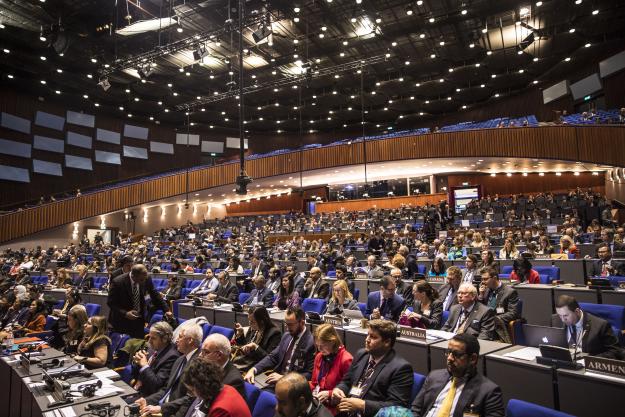
Delegates at the Twenty-Fourth Conference of States Parties to the Chemical Weapons Convention
THE HAGUE, Netherlands —25 November 2019— Remaining vigilant and strengthening the international norm against chemical weapons in the face of their continued use was the main message from the opening day of the Twenty-Fourth Session of the Conference of the States Parties (CSP-24) to the Chemical Weapons Convention (CWC), taking place from 25 November-29 November 2019 in The Hague. The Conference oversees the implementation of the Chemical Weapons Convention, promotes the Convention’s objectives, and reviews compliance with the treaty.
The Conference is being chaired by Permanent Representative of Bulgaria to the Organisation for the Prohibition of Chemical Weapons (OPCW), H.E. Ambassador Krassimir Kostov, who assumes the duties from outgoing Chairperson, H.E. Ambassador Yun-young Lee, of the Republic of Korea.
The Director-General of the OPCW, H.E. Mr Fernando Arias, welcomed delegations, representatives of international organisations and industry associations in his opening statement, and expressed: “Sustained and productive cooperation between the OPCW and our partner organisations is essential to succeeding in our common endeavour.”
The Director-General stressed that the Organisation must adapt to meet the current and future challenges of preventing the re-emergence of chemical weapons. He reiterated that “The recent use of chemical weapons, as well as the potential for misuse of advances in science and technology, dictates that we remain vigilant, agile, and fit for purpose.”
Additionally, he highlighted progress made in the project to create a new Centre for Chemistry and Technology, briefed States Parties on the progress of elimination of declared stockpiles of chemical weapons, and outlined that States Parties will also be requested to consider changes to the schedules of chemicals contained in the Annex on Chemicals to the Convention.
The Conference serves as a platform to discuss and take decisions on topics such as next year’s programme and budget, as well as further cooperation and outreach activities to strengthen the Chemical Weapons Convention and to universalise its underpinning norm.
Throughout the Conference, side events arranged by States Parties and civil society will cover a wide array of topics related to the Convention and chemical warfare.
On Monday, 25 November, there will be a ceremony to honour the three recipients of the OPCW-The Hague Award. The ceremony will held at 17:20 CET and will be webcast from the OPCW website (www.opcw.org).
On Friday, 29 November, delegations and participants present at the Conference will honour the victims of chemical weapons, and demonstrate their commitment to the norm against chemical weapons in all circumstances. The ceremony will include a wreath-laying and moments of reflection in the Organisation’s memorial garden.
Throughout CSP-24, the Director-General will hold bilateral meetings with senior government officials and other representatives. This year, 158 out of 193 Member States are participating in CSP-24. Representatives from international organisations, chemical industry and civil society will also attend and make statements.

Background
The Conference of the States Parties meets annually to assess the implementation of the Chemical Weapons Convention (CWC) and to make key decisions regarding the future work of the Organisation. The Conference of the States Parties oversees the implementation of the Chemical Weapons Convention, promotes the treaty’s objectives and reviews compliance with the treaty. The Conference is composed of representatives of all Member States of the OPCW, each of which has one vote.
The Review Conference, occurring every five years, is an opportunity for all States Parties to review the operations of the Chemical Weapons Convention and set a strategic direction for the OPCW in the next five years. States Parties offer recommendations for enhancing the OPCW’s work in the areas of verification, assistance and protection, international cooperation, capacity development, and outreach.
As the implementing body for the Chemical Weapons Convention, the OPCW, with its 193 Member States, oversees the global endeavour to permanently eliminate chemical weapons. Since the Convention’s entry into force in 1997, it is the most successful disarmament treaty eliminating an entire class of weapons of mass destruction.
Over 97% of all chemical weapon stockpiles declared by possessor States have been destroyed under OPCW verification. For its extensive efforts in eliminating chemical weapons, the OPCW received the 2013 Nobel Peace Prize.
